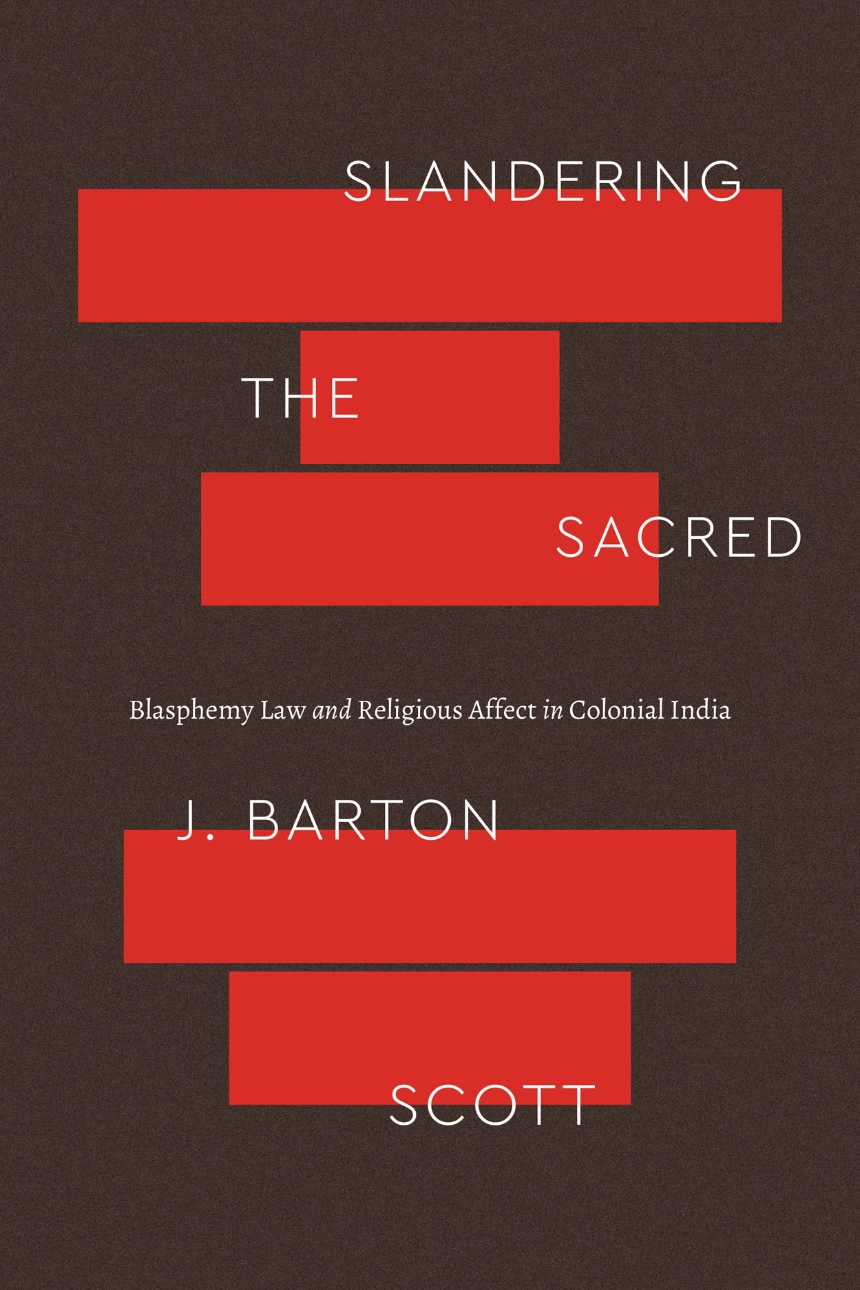Slandering the Sacred
Blasphemy Law and Religious Affect in Colonial India
9780226824901
9780226824888
9780226824895
Slandering the Sacred
Blasphemy Law and Religious Affect in Colonial India
A history of global secularism and political feeling through colonial blasphemy law.
Why is religion today so often associated with giving and taking offense? To answer this question, Slandering the Sacred invites us to consider how colonial infrastructures shaped our globalized world. Through the origin and afterlives of a 1927 British imperial law (Section 295A of the Indian Penal Code), J. Barton Scott weaves a globe-trotting narrative about secularism, empire, insult, and outrage. Decentering white martyrs to free thought, his story calls for new histories of blasphemy that return these thinkers to their imperial context, dismantle the cultural boundaries of the West, and transgress the borders between the secular and the sacred as well as the public and the private.
Why is religion today so often associated with giving and taking offense? To answer this question, Slandering the Sacred invites us to consider how colonial infrastructures shaped our globalized world. Through the origin and afterlives of a 1927 British imperial law (Section 295A of the Indian Penal Code), J. Barton Scott weaves a globe-trotting narrative about secularism, empire, insult, and outrage. Decentering white martyrs to free thought, his story calls for new histories of blasphemy that return these thinkers to their imperial context, dismantle the cultural boundaries of the West, and transgress the borders between the secular and the sacred as well as the public and the private.
272 pages | 15 halftones | 6 x 9 | © 2023
Class 200: New Studies in Religion
Asian Studies: South Asia
History: Asian History
Religion: Comparative Studies and History of Religion, Religion and Society, South and East Asian Religions
Reviews
Table of Contents
1 Introduction: Secularizing Blasphemy
Part One: The Merry Prophet
2 A Crisis of the Public: The Rajpal Affair and Its Bodies
3 Secularism, High and Low: Making the Blasphemy Bill
Part Two: Blasphemy’s Empire
4 Codifying Blasphemy: Religious Feelings between Colony and Metropole
5 Macaulay Unmanned, or, Tom Governs His Feelings
6 Libeling Religion: Secularism and the Intimacy of Insult
Part Three: Polemics as Ethics
7 Printing Pain, Ruling Sentiment: A Brief History of Arya Insult
8 The Arya Penal Code: Law and the Practice of Documentary Religion
9 The Swami and the Prophet: Slandering Lives, Conducting Character
10 Conclusion: A Feeling for “Religion”
Acknowledgments
Notes
Index
Part One: The Merry Prophet
2 A Crisis of the Public: The Rajpal Affair and Its Bodies
3 Secularism, High and Low: Making the Blasphemy Bill
Part Two: Blasphemy’s Empire
4 Codifying Blasphemy: Religious Feelings between Colony and Metropole
5 Macaulay Unmanned, or, Tom Governs His Feelings
6 Libeling Religion: Secularism and the Intimacy of Insult
Part Three: Polemics as Ethics
7 Printing Pain, Ruling Sentiment: A Brief History of Arya Insult
8 The Arya Penal Code: Law and the Practice of Documentary Religion
9 The Swami and the Prophet: Slandering Lives, Conducting Character
10 Conclusion: A Feeling for “Religion”
Acknowledgments
Notes
Index
